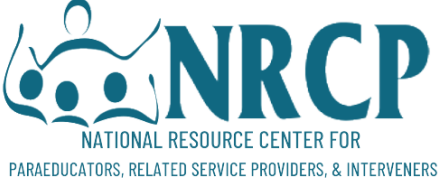Updated ReCredentialing Information!
On September 14 and 19, 2023 Dr. Marilyn Likins, Executive Director of the National Resource Center for Paraeducators, Interveners, and Related Service Providers (NRCPara) shared updated recredentialing information. If you were unable to attend the webinars, please see the presentation here and download a pdf version of the presentation. The new recredentialing matrix is available here and below. Scroll down this page for more information on recredentialing.
Webinar Summary: These sessions provided an overview of the process, details about the wide variety of ways to earn points, and some specific ideas to get interveners started on the path to recredentialing. These presentations applied to interveners who have had their National Intervener Credential for years, those who just received one, and even student interveners who are currently taking classes.

Introduction
The need for Intervener training programs has long been recognized in the field of deafblindness. Although some local, state, and regional programs have been developed to address this need, the common standards, competencies, rigor and practices among these training programs vary greatly.
The NRCP National Intervener Credentialing Program utilizes the full set of CEC standards, knowledge and skill competencies, and practices in a way that is both rigorous and accessible. Administrators of Local Education Agencies (LEAs) and State Education Agencies (SEAs) can be assured that interveners who have completed the approved training, practicum, and credentialing process have met the standards recognized beyond their local school, district, and state.
Interveners can also apply for national credentialing through the National Intervener and Advocate Association (NIAA).
Intervener Requirements & Credentialing Process
The requirements for obtaining the NRCP National Intervener Credential
include:
- Candidates must take a minimum of 12 hours of credited, approved coursework from an Institution of Higher Education (university or college) and must earn a grade of B minus or better. This includes a qualified course instructor responsible for directing and guiding the work of the candidate throughout the Higher Education Intervener training program.
- Coursework must include a supervised practicum experience.
- The practicum experience (minimum of 2-3 credit hours) must include coaching for skill development under the supervision of the course instructor and the guidance of a trained Intervener Coach, who is an expert in deafblindness. This practicum experience includes a minimum of 200+ hours of contact time with someone who is deafblind and a minimum of 3 coaching sessions.
- Develop an Intervener Portfolio, based on the specialized set of Council for Exceptional Children (CEC) National Intervener Standards and Competencies (2022). These revised standards will be reflected in future portfolio requirements. The Intervener Portfolio must provide specific documentation showing the candidate has acquired the knowledge and demonstrated the skills needed to be a highly effective intervener. This Intervener Portfolio should be completed with instructor support and ongoing feedback throughout the process.
- Upon completion, the Intervener Portfolio will receive a final review by the course instructor.
- The Course Instructor will then submit the instructor-approved portfolio to the National Resource Center for Paraeducators (NRCP) Executive Director who evaluates the portfolio to determine if it meets the requisite standards and competencies for the National Intervener Credential. Depending on the portfolio, this review process will take 2-4 weeks.
- The NRCP will notify the candidate when their portfolio has been approved. If changes are required prior to final approval they will be contacted with suggestions for change and can resubmit for final approval.
- Once approved, the candidate will submit a $100 processing fee (use the PayPal link below for payment) and a completed formal application for the National Intervener Credential.
- The candidate can download the Intervener Credential Application here, but the candidate will also receive the application as an attachment to their notification email.
- Upon receipt of the processing fee and completed application, the NRCP generates the National Intervener Credential, which is printed, and mailed to the Intervener.
Please Contact Us if you have any questions about the credentialing process.
Resources
- Competencies for Training Interveners to Work with Children and Students with Deafblindness, 2021
- NRCP Intervener Portfolio Assessment Form
Who Can Provide Training for the National Intervener Credential?
Two university programs have been approved and are offering coursework toward credentialing: Central Michigan University and the Institute for Disability Research, Policy & Practice (IDRPP) located at Utah State University.
Click to learn more about the Central Michigan University Program and the Intervener Training Program through IDRPP at USU.
The NRCP welcomes other intervener training programs to apply for national credentialing. Please contact Marilyn Likins, Executive Director, NRCP to begin the dialogue, discuss possible options, and address any questions or concerns. Marilyn can be reached through e-mail at marilyn.likins@usu.edu. See the following checklist for details related to program development leading to the NRCP National Intervener Credential. National Intervener Credential Program Criteria.
National Intervener ReCredentialing
The National Intervener Credential is valid for 5 years, after which time it needs to be renewed. Interveners can begin working on the renewal process through their professional development activities any time on or after their credential start date.
To register for NRCP Recredentialing, click here.
Download Requirements for National Intervener ReCredentialing Here
